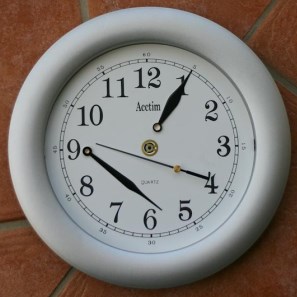 Like a ninja in the night, Hanz M., AKA Hanzo, stalks across Hesse University’s Dresden campus. The go-to man in the IT department, he fixes the messes that others leave behind. This is one of his stories.
Like a ninja in the night, Hanz M., AKA Hanzo, stalks across Hesse University’s Dresden campus. The go-to man in the IT department, he fixes the messes that others leave behind. This is one of his stories.
The order had come from the Dean of Dresden campus herself. In an effort to maximize classroom time (and justify expenditure budgets), lecture times would now be accurate to the second. IT would be responsible for the deployment of new, centrally synchronized clocks.
"I just don’t get what the fuss is about," Gertrude said. She and Hanzo were discussing the Dean’s edict that afternoon. "It’s not like the professors will end their lectures on time, even after we install them all."
"‘It is especially important,’" Hanzo quoted, "‘to know the background timing, otherwise your strategy will become uncertain.’ From The Book of Five Rings."
"According to you," Gertrude said, "Everything applies to The Book of Five Rings."
"So who do we ask to requisition a new batch of clocks?" Hanzo asked.
"All requests must come through central IT in Berlin," Gertride said. "And they never cooperate with branch IT departments. They’ll cut corners until we bleed."
"Let me handle it," Hanzo said. "I might be able to persuade them to get us the right equipment for once. How do I get in touch?"
Radio-Free Europe
Hanzo’s emailed request to central IT was simple: 200 network-synchronized rotary clocks, an industry standard, to be ordered from a reputable company, along with some additional Ethernet cable and boxes.
Central IT replied within the hour. Network synchronization is too expensive, they said. Would radio-synchronized clocks be acceptable?
No, Hanzo replied. Radio synchronization doesn’t work indoors, and Dresden’s campus is too widespread. The clocks must be network-synchronized.
The equipment has been ordered, central IT replied.
The clocks arrived a week later. The delivery man left 20-odd boxes at the front of the IT office. "It’s just the clocks," Gertrude said. "They didn’t send the cable or the boxes we ordered."
Hanzo opened the box closest to him. His heart sunk. "These are radio-synchronized clocks," he said. "I told them not to order these!"
World out of Sync
Hanzo’s complaints, polite at first but increasingly irritated, were all ignored by central IT in Berlin. We cannot accommodate your request, they replied after his tenth email. It is too expensive to return the clocks you ordered.
Hanzo decided to install the clocks anyway. It took maintenance nearly a month to replace the battery-operated clocks with the fancy new radio-synchronized ones, as their records of where clocks were actually installed on campus were rather scant.
The fall semester began, and all was well for a few weeks. Hanzo made sure the central clock, kept in the IT office and against which the other campus clocks pinged against, was itself synchronized to atomic time. He thought the crisis was over.
The the Dean herself paid IT a visit.
"My request was simple, I thought," the Dean said. She was a short, skinny, shrivelled old woman, like Gollum in a navy blue business suit. "All the clocks must be synchronized to the second!" She stamped her foot. "One of the clocks in the Art and Science building is nearly five minutes slow! Our lecture times only allow four minutes between classes!"
Hanzo tried to explain. "Central IT denied our request for networked clocks. They sent us radio-synchronized clocks instead. We’ve been making do with inferior technology."
"If you need networked clocks," the Dean said, "I’ll make sure you get them!"
The Jefferson Method
The Dean couldn’t get central IT to budge. Budget cuts, they cited. The Dresden campus would have to make do with radio-synchronized clocks, which were all quickly falling out of sync.
So Hanzo came up with a solution to please both parties.
"Take good care of this," Hanzo said, handing the accurate IT clock to one of the maintenance workers. "Just place this clock in each classroom for a few minutes, then move on to the next. The clocks will be in close enough proximity to sync themselves. Sync the clocks every few weeks, and they won’t be more than a second out of sync from now on."
"I wonder," Gertrude said, as the workers left with the IT clock, "if Thomas Jefferson, that American president, had as much trouble keeping his clocks in sync."
"He had the benefit of American ingenuity," Hanzo said. "We only have German bureaucracy to work with."
Photo credit: cacophonyx / Foter / CC BY-SA

